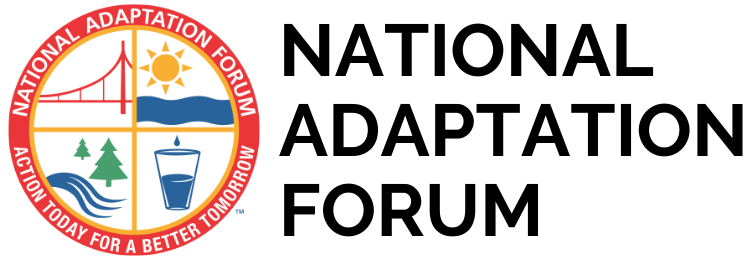
About the Series
The virtual Climate Displacement Series is a five session series brought to you by EcoAdapt’s National Adaptation Forum, that will take an interconnected look at climate displacement pressures along with approaches to prevent displacement or adapt by exploring migration, current managed retreat and relocation strategies, equity implications, and policy considerations.
Series Resources
Resources Sheet
Bonus Questions and Answers
Session Descriptions
Session One: Climate displacement and anti-displacement strategies
SPEAKERS
Kirsten Cook, Partnership for Southern Equity
Climate change is playing a bigger role in determining where and how we live and is limiting access to and availability of affordable healthy housing, healthy food choices, transportation choices, and social networks, which is forcing the displacement of individuals and communities. Displacement—whether temporary or permanent, forced or voluntary—is an issue rooted in inequity and exacerbated by climate change. This webinar will share the results of EcoAdapt’s State of Adaptation Program report for Strong, Prosperous, and Resilient Communities Challenge on if and how people working to address displacement pressures are considering the effects of climate change, including examples and case studies of climate-informed anti-displacement efforts from Partnership for Southern Equity and Bay Area Regional Health Inequities Initiative.
Session Two: Household-level retreat
SPEAKERS
Fawn McGee, NJDEP Blue Acres & Green Acres Program
Dr. Kim Mosby, Louisiana State University Coastal Sustainability Studio
Olga McKissic, H.L. Neblett Community Center, Inc.
Moderator: Anna Weber, Natural Resource Defense Council
Households across the U.S. are facing climate-related pressures such as repeat flooding and extreme weather events, making it increasingly difficult for people to stay in the places where they live today. Among the millions who could be displaced in the coming decades, many will need assistance to move to higher ground. This webinar will discuss programs throughout the U.S. that work on household-level retreat with analysis on Federal, state, and local buyouts programs. The discussion will also highlight lessons learned from managed vs. unmanaged retreat.
Session Three: Community-wide protection, relocation, and expansion
SPEAKERS
Walter Nelson, City of Napakiak
Sophia Katchatag, Native Village of Shaktoolik
Twyla Thurmond, City of Shishmaref
Kelsey Moldenke, Quinault Nation
Moderator: Alessandra Jerolleman, Jacksonville State University
Facing displacement pressures as a community brings its own set of challenges. This webinar will focus on considerations for protection, retreat, and relocation at the community-level. It will narrow in on cases of communities that remain on the frontlines of severe displacement challenges and continue to adapt. Panelists will discuss the decision-making processes, successes, and on-going challenges for managed retreat, relocation, site expansion in their communities. The lessons shared can be utilized by other communities experiencing these decisions in their own geographies while also elevating the distinct obstacles faced by the communities on the panel.
Session Four: Migration and receiving communities
SPEAKERS
María Perales Sanchez, Centro de los Derechos Del Migrante, Inc.
Mathew Hauer, Center for Demography and Population Health, Florida State University
Dr. Fernando Rivera, University of Central Florida
Dr. Kim Mosby, Louisiana State University Coastal Sustainability Studio
Moderator: David Flores, Center for Progressive Reform
Climate models predict that tens of millions of people will be displaced from coastal areas alone by 2100 in the U.S. Additional climate impacts may lead to an even greater number of displaced people, all leading to migration at local, regional, national, or international scales. As climate-related migration increases, receiving communities must consider effective policies for population increases and changes. This webinar will center a discussion on climate migration impacts and considerations for receiving communities.
Session Five: Policy considerations at multiple scales
SPEAKERS
Micah McMillan, U.S. Government Accountability Office
Joseph Thompson, U.S. Government Accountability Office
Katie Spidalieri, Georgetown Climate Center
Climate displacement and its associated adaptation strategies require effective policies across multiple governance scales. This webinar will feature recent policy recommendations for the Federal, state, and local levels. It will discuss equity, justice, and human rights aspects to consider in policy-making and look ahead at policy solutions for communities that are recipients of climate migration.

